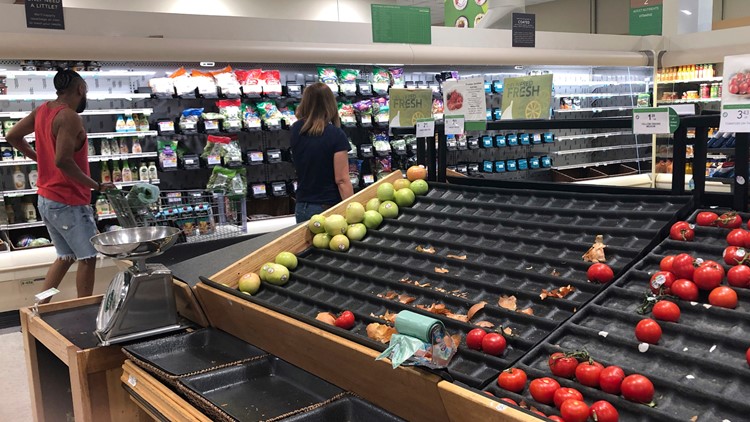DALLAS — There’s no need for hoarding and panic buying at grocery stores because warehouses are full, and trucks are distributing products, said the president of a global logistics company with a large operation in North Texas.
“I wouldn’t worry about the lack of product in the supermarkets and grocery stores,” said Ike Brown, President and Vice Chairman of NFI Industries. “There’s plenty of product out there. There’s no need for panic buying.”
NFI Industries, a New Jersey-based company, employs 865 workers in North Texas, and operates three million square feet of warehouse space locally and almost a thousand tractors and trailers in this region. The company transports thousands of products daily for Fortune 100 companies including everything from household appliances to items like toothpaste – and toilet paper.
“There hasn’t been a shortage of toilet paper. That’s a phenomenon I haven’t figured out yet,” Brown added. “Not only do we haul it in our trucks, but we also warehouse toilet paper for several large manufacturers. There’s plenty of paper goods available out there.”
The food and beverage element of the domestic supply chain is surging right now.
But other elements of NFI’s business like apparel clients have ground to a halt after malls and clothing stores temporarily closed because of the pandemic.
Even as other companies park their truck fleets during this pandemic, Brown said NFI is now leasing those trucks just to meet increased demand.
“We are getting calls from other dedicated fleets that maybe are in the mattress business or some business where people just aren’t buying,” he explained, “and they’re looking to keep their trucks busy. So, they’re calling us to see what we can do and there are some instances where we are using some of their trucks when we need some extra capacity.”
In Texas, the supply chain is a bright spot in the state economy right now.
On Sunday night, Texas Comptroller Glenn Hegar warned lawmakers that the state would likely take a large financial hit because of the virus. Hegar reportedly calling this “the current recession,” according to the Texas Tribune.
Halliburton furloughed 3,500 employees at its Houston-headquarters on Monday, and Texas could lose 268,000 hotel-related jobs, according to the American Hotel & Lodging Association.
And two of the nation’s largest airlines, Dallas-based Southwest Airlines and Fort Worth-based American Airlines, said they are awaiting a bailout from Congress, rather than resorting to furloughs and layoffs.
But even as logistics firms like NFI are moving products domestically, the coronavirus has crippled the global supply chain. Factories in China stopped producing goods when workers there were sent home because of the coronavirus outbreak. Since then, intermodal containers have sat empty and stacked up at major ports.
That has created a backlog which will likely prove especially damaging to companies that rely on parts from overseas to build products in North America.
“Supply chains are a problem so sticky that they take time to resolve,” said Senthil Veeraraghavan, a professor at the Wharton School at the University of Pennsylvania in podcast last week. Even if production “comes back to 100% levels, let’s say as about six months back,” there will be delays of up to a few months in getting products to consumers, and that situation will continue until fall 2020, he added.
Fortunately, factories in China appear to be rebounding, Veeraraghavan said in the podcast. “[We are] seeing some life for production and consumption coming back in China.”
Apple, for instance, reopened all its 42 stores in China last Friday, he continued.
NFI’s Ike Brown said he expects his rail and trucking business to increase even more next month, when the first of those international shipments begin arriving from China.
“We’ve already been told by our accounts [to] get ready for the third or fourth week of April because China is back on stream [and] that we’re going to be hit with a lot of product,” Brown explained.
The foreign product will put some people back to work in the American ports and warehouses that have sat idle for months as the coronavirus spread around the globe. The imports could also help jumpstart the American economy providing that the health situation either levels off or begins to improve.



